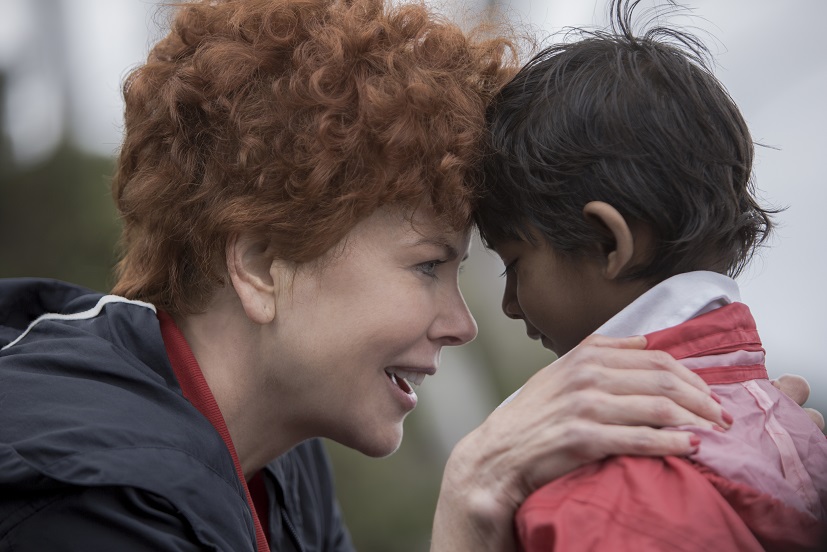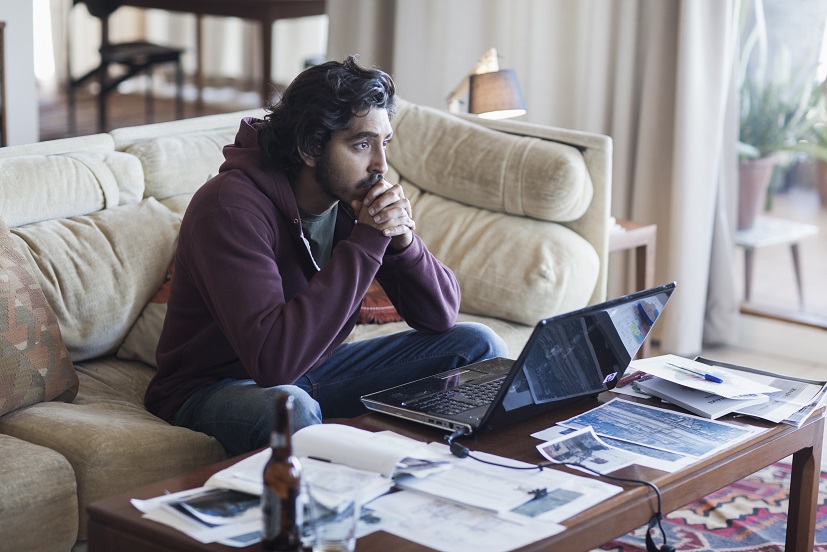Lady Macbeth review - memorably nasty
Feminist psychosis in 19th-century Northumberland
The Scottish play’s traces are faint in this bloody, steamy tale of feminist psychosis.
The Scottish play’s traces are faint in this bloody, steamy tale of feminist psychosis.
Three teenage boys meet at dawn. One of them, blonde and beautiful Simon (Gabin Verdet), jumps out of his girlfriend’s window and rides his bike through the dark Lyon streets to meet the others in their van. They drive almost silently to the beach, put on wetsuits and catch waves. A grey sea, a grey sky: we can hardly see where foam ends and cloud begins. It’s mesmerising, wordless, and the camerawork is superb, as is Alexandre Desplat’s score. We’re inside the curl of the wave, as immersed in it as Simon. Then the surfer dudes are back in the van, exhausted, on the road home.
There is a distinctive look, feel, even sound to a stage production directed by Ivo van Hove, which is becoming rather familiar to London theatregoers after two cult hits, A View From the Bridge and Hedda Gabler.
Park Chan-wook is a Korean decadent and moralist who’d have plenty to say to Aubrey Beardsley.
“I never saw anything like it,” declares Billy Pilgrim in wonderment. “It’s the Land of Oz.” He has just seen Dresden’s splendour from the train carriage into which he and other American prisoners of war are crammed en route to the city. They’ve been told it will be easier there than the prison camp they’ve left: they will experience less hardship at their new quarters. Dresden is not the Land of Oz, though.
The social permutations of love are beguilingly explored in the 90-minute stage traffic of Marivaux’s The Lottery of Love, with Paul Miller’s production at the Orange Tree Theatre making the most of the venue’s unencumbered in-the-round space to dance the action along at a brisk pace. The only adornment in Simon Daw’s design is an elaborate chandelier, bedecked with candles and hanging roses, but the sheer élan of the piece more than occupies the stage in itself.
Karen Blixen (1885-1962), the prolific Danish storyteller, is perhaps most immediately recognised for the portrayal of her and her works on the big screen, above all by Meryl Streep in Out of Africa. But her own story, and her place in the literary canon, can often be overlooked. Over the past three years I’ve been working closely with Riotous Company on Out of Blixen, a production exploring the many sides to Blixen and the rich layers of her tales.
Like many first novels, Evelyn Waugh’s Decline and Fall has a strong whiff of autobiography. It is a revenge comedy in which Waugh – like Kingsley Amis after him in Lucky Jim – transmutes his miserable experiences of teaching in Wales into savage farce.
The homecoming narrative is one of the most elemental ones we know, playing on the most primal human emotions. Stories of separation and reunion have been handed down from time immemorial, varying in their specifics but dominated by their intricate connection to feelings of origin and identity. Lion may be inextricably linked to the details of contemporary life in one sense, but its final scenes have a power that goes far beyond it. In director Garth Davis’s hands the story is told with a sensitivity that avoids the lure of sensationalism.
Adapted from Saroo Brierley’s memoir A Long Way Home, the film is based on a true story. Given that it’s one we may have heard about before watching – and the film’s existence presupposes a certain conclusion – the ending feels less important than the story that has come before (the final mystery actually lies in the title). Set between India and Australia, its action crosses continents – and, no less importantly, the very different ways of lives we see in each – and amply realises Lion’s cinematic potential.
Pawar conveys a wide-eyed, silent wonder as he discovers it all
Davis and his cinematographer Greig Frasier relish wide landscapes, presented through panoramic aerial shots, and Lion opens high above the dry plains of central India, the year 1986. It’s the subsistence world in which five-year-old Saroo (Sunny Pawar, who has real screen panache) lives. His life revolves around his mother (Priyanka Bose), who works as a labourer, and his adored older brother Guddu, who does whatever odd jobs he can. Their very basic existence is grounded in family love, more often conveyed through gesture and image than words, in a film whose first half is spare on dialogue.
Saroo’s eagerness to prove that he too can make a contribution precipitates Lion’s first dislocation. Accompanying Guddu to a nearby town, his elder brother leaves him sleeping on a railway station bench. The next thing we know, Saroo is waking up on an empty train taking him off to an unknown destination, his cries of help to anyone he sees in the passing landscape ignored. If that’s a shock, arrival more than a thousand miles away at Kolkata’s teeming main terminus is an immersion in horror, not least because he speaks only Hindi in this frenzied Bengali conglomeration.
Saroo may slowly find his bearings in this unfamiliar world, but his survival is initially a matter of chance as he’s hassled by police and narrowly escapes the attentions of others whose designs on him are clearly sinister. Even when a chance act of kindness brings him to an orphanage, it’s a far from nurturing environment. We get a sense of the city’s variety, from the station underpasses (lit in anaemic yellows) in which Saroo sleeps on cardboard, through its shrines and streets, to the sheer scale of life around the wide Hooghly river.
 When all attempts to resolve the mystery of where he has come from fail, Saroo is chosen for international adoption, and his next removal is to Tasmania, to his new parents Sue and John Brierley (Nicole Kidman, David Wenham). After the aridity and tumult of India, this Australian landscape is an open one, dominated by water, every bit as unfamiliar to Saroo as the refrigerator and television in his new home. Pawar conveys a wide-eyed, silent wonder as he discovers it all, and he’s anchored by Sue's unquestioning presence. There’s nothing glamorous about Kidman (pictured above with Pawar) – even for late-80s Tasmania she seems almost determinedly plain – but she’s translucently sure of herself, emanating a stillness that captures the screen. It’s an assurance that will be tested with the arrival of the couple’s second adopted son, Mantosh, clearly damaged by his experience in a way that Saroo has avoided.
When all attempts to resolve the mystery of where he has come from fail, Saroo is chosen for international adoption, and his next removal is to Tasmania, to his new parents Sue and John Brierley (Nicole Kidman, David Wenham). After the aridity and tumult of India, this Australian landscape is an open one, dominated by water, every bit as unfamiliar to Saroo as the refrigerator and television in his new home. Pawar conveys a wide-eyed, silent wonder as he discovers it all, and he’s anchored by Sue's unquestioning presence. There’s nothing glamorous about Kidman (pictured above with Pawar) – even for late-80s Tasmania she seems almost determinedly plain – but she’s translucently sure of herself, emanating a stillness that captures the screen. It’s an assurance that will be tested with the arrival of the couple’s second adopted son, Mantosh, clearly damaged by his experience in a way that Saroo has avoided.
Cut forward to 2008. Saroo, now played by Dev Patel (pictured below) as a lightly bearded, gangly 25-year-old, has come to Melbourne to study. He's winningly confident in this new world of international contacts, which includes Lucy (Rooney Mara), an American student who becomes the film's understated romantic interest, as well as some Indians at the same college. It’s when he visits the latter for a meal that he’s thrown back into a past that he has seemed to blank out completely: it’s a distinctly Proustian moment, the re-association coming with jalebis, the brightly coloured Indian sweets that are lodged deep in his memories. In fact, food – and how you eat it – provides a nicely linked connection in Luke Davies’s screenplay. In childhood Saroo ate with his fingers, then a scene in Kolkata shows him discovering a spoon; part of his formal preparation for going abroad involves laboriously learning table manners, while with his new Indian friends, he’s once again inducted into eating with his fingers.
 But it’s something else that he learns from them that propels Lion’s denouement. When Saroo opens up about his past, their mention of Google Earth sets him on a new journey, which will both disrupt his Australian life and (no particular spoiler alert) open a new Indian world. That it’s a piece of new technology that sets him out on his journey home may seem at first anomalous – myths normally being made of things other than GPS coordinates and screen images – but there’s no disputing the reality of Saroo’s story: we see its real-life conclusion in the film’s coda.
But it’s something else that he learns from them that propels Lion’s denouement. When Saroo opens up about his past, their mention of Google Earth sets him on a new journey, which will both disrupt his Australian life and (no particular spoiler alert) open a new Indian world. That it’s a piece of new technology that sets him out on his journey home may seem at first anomalous – myths normally being made of things other than GPS coordinates and screen images – but there’s no disputing the reality of Saroo’s story: we see its real-life conclusion in the film’s coda.
To say that Davis doesn’t complicate Lion is meant as a compliment, relying as he does instead on some excellent playing, from Patel and Kidman especially. Its vision of India may not surprise, and be somewhat served up for international tastes, but it doesn’t milk its story. Lion has a cinematic heft, not least in an emotive, often piano-driven score from Dustin O’Halloran and Hausckha that fills the screen, but finally allows the simplicity of its story to speak for itself.
Overleaf: watch the trailer for Lion
Khaled Hosseini's 2003 bestseller ticks all the boxes as an A-level text. A personal story with epic sweep, it interweaves the bloody recent history of Afghanistan with a gripping family saga.